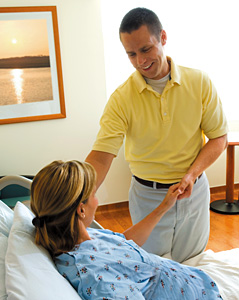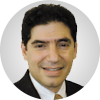Beneficence is the moral principle of trying to bring about a positive outcome. In talking to thousands of doctors and chiropractic students, the most common reason I've heard for the choice to become a chiropractic physician is a personal experience of being helped by the care of a chiropractor, sometimes where other health professionals were not able.
Our critics seem to believe the reason why people get into chiropractic is because they're money hungry. When I entered Texas Chiropractic College in 1979, many of my classmates and I really had no idea we could make much of a living as a chiropractor. We really just wanted to help others and do so using a therapeutically conservative method.
Some of our critics think the reason why people become chiropractors is that somehow they were diluted into believing in some kind of crazy calling. They also believe our patients must be uneducated to "fall" for what we offer.1 Well, the research tends to say our patients are better educated.2-3 Astin2 also found that they haven't chosen CAM because they've found conventional medicine ineffective but that it fits their world view that health comes from within.
 Typically, acts of beneficence that most people ascribe to health care workers come in the clinical setting, when one is treating a patient who is suffering and is helped through our care. Obviously our treatments are predominantly hands-on care. It is a special and unusual gift to be able to help relieve another human being's suffering by using our hands. People in physical medicine, physical therapy, occupational therapy and surgeons also know the feeling of providing help with their hands as the primary tool.
Typically, acts of beneficence that most people ascribe to health care workers come in the clinical setting, when one is treating a patient who is suffering and is helped through our care. Obviously our treatments are predominantly hands-on care. It is a special and unusual gift to be able to help relieve another human being's suffering by using our hands. People in physical medicine, physical therapy, occupational therapy and surgeons also know the feeling of providing help with their hands as the primary tool.
But not every act of beneficence we do for patients is necessarily because of using our hands. Recently I heard from a friend and colleague who apologized for not being on a conference call because of a problem with a patient. The doctor lives in an isolated community and his patient was an elderly woman who had no family locally. She was a pedestrian in a hit-and-run accident. When she arrived at the hospital, she was very disoriented and wouldn't allow anyone to treat her. She had head trauma and a fractured pelvis. Because she'd had an office visit earlier that day with my colleague, they found his business card on her and called him.
He rushed to the emergency room and was ushered in to see her. Despite not knowing her own name, the woman recognized her chiropractor, who was able to calm her down and convince her that she should let the emergency-room staff tend to her injuries. My friend ended up spending eight hours at her side through all the testing and treatment. He only left after she'd been stabilized and was resting.
Imagine, eight hours in a hospital with a patient and not one minute of it billable. This is hardly what one thinks of as the typical act of beneficence of a health care provider, but I am willing to bet that it actually isn't that uncommon. It is very hard to turn off the "helping." In fact, the always helping is a problem I've talked about when lecturing on risk management. That desire to help, say even when at a social event, can cause problems when one offers health care advice without adequate data (complete history and examination).
Nevertheless, the public sometimes distrusts all health care providers and thinks they only do what they do for money. And there is some evidence that, particularly in the United States with a fee-for-service-driven health care system, that money does drive a lot of decisions.
We know there is excessive waste due to maximizing services billed when possible. As Atul Gawande notes, there is an attitude in some places of "not leaving any money on the table"; making sure one bills for every possible service.4 Of course, there are those who do every test possible for fear of malpractice.5 Despite the overtesting, it seems the malpractice problem in America isn't frivolous claims6 or defensive medicine,5 but just plain poor health care.7
With all this talk about money and poor health care, my friend spent eight hours in the hospital and had neither hope nor intention of receiving one cent for doing so. The patient was elderly and had been a patient of his for 30 years.
So, what did he get out of this? He got to help another human being. There was no secondary benefit. She wasn't likely to refer new patients, as with many elderly, their circle of friends tends not to grow. Given her age, she wasn't likely to remain a patient and thus pay for services for many more years. There really wasn't any secondary gain; he just got to help another human being.
I had initially thought of including this chiropractor's name or details about him, but again, I said there should be no secondary gain. Last year, my father died and the rabbi who officiated at his funeral was asked about why it is tradition among Jews for everyone to put dirt on the casket after the service. He said the reason for doing this was it was the most pure form of kindness because almost any other act of kindness might be done because of benevolent self-interest. He said other acts of kindness can be done while thinking that in the future, this person I help will do me some kindness. But when someone dies, there is never anything the deceased can do to help the funeral attendee who, in an act of kindness, helps bury them.
I truly hope this poor woman recovers completely. But even so, given her lack of close relatives, limited new contacts and advanced age, the likelihood that my friend – who just helped by comforting her and getting her to accept the care being offered in the emergency room – will get more than her gratitude is very slim. But that's OK because sometimes, going the extra mile is done for no other reason than altruistic beneficence. I want to thank my friend for showing that being a professional is always about the patient.8
References
- Beyerstein BL. Alternative medicine and common errors of reasoning. Acad Med, 2001;76(3):230-7.
- Astin JA. Why patients use alternative medicine: results of a national study. JAMA,1998;279(19):1548-53.
- Coulter ID, Hurwitz EL, Adams AH, Genovese BJ, Hays R, Shekelle PG. Patients using chiropractors in North America: who are they, and why are they in chiropractic care? Spine, 2002;27(3):291-6.
- Gawande A. "The Cost Conundrum." The New Yorker, June 1, 2009.
- Massachusetts Medical Society. Investigation of Defensive Medicine in Massachusetts. Waltham, MA: 2008.
- Studdert DM, Mello MM, Gawande AA, Gandhi TK, Kachalia A, Yoon C, et al. Claims, errors, and compensation payments in medical malpractice litigation. N Engl J Med, 2006;354(19):2024-33.
- Gandhi TK, Kachalia A, Thomas EJ, Puopolo AL, Yoon C, Brennan TA, et al. Missed and delayed diagnoses in the ambulatory setting: a study of closed malpractice claims. Ann Intern Med, 2006;145(7):488-96.
- Perle SM. "The Patient, Stupid." Dynamic Chiropractic, Sept. 23, 2012.
Click here for previous articles by Stephen M. Perle, DC, MS.





